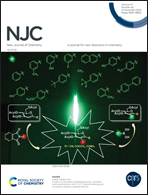Binuclear cobalt(ii) complexes: synthesis, structure, characterizations and catalytic applications in acceptor-less dehydrogenation (AD) of primary alcohols into aldehydes†
Abstract
In this study, three novel binuclear, distinctly defined, air-stable cobalt(II) complexes, denoted by the formulas [Co(H2L1)]2(1), [Co(H2L2)]2(2) and [Co(H2L3)]2(3), are reported. Binuclear cobalt(II) complexes (1–3) namely bis-[3,3′-bis[(2,6-dimethyl-phenylimino)-methyl]-[1,1′]-biphenyl-2,2′-dioxo cobalt(II)] (1), bis-[3,3′-bis[(2,6-di-i-sopropylphenyl)imino)methyl)-[1,1′-biphenyl]-2,2′-dioxodicobalt(II)] (2) and bis-[3,3′-bis[(2,6-diethyl-phenylimino)-ethyl]-[1,1′]-biphenyl-2,2′-dioxo cobalt(II)] (3) were synthesised and isolated for the first time. Several techniques, including mass spectrometry, UV-visible spectra, FT-IR spectra, elemental analysis, and single-crystal X-ray diffraction, were used to ascertain the structural properties of the binuclear cobalt(II) complexes. All these binuclear cobalt(II) [Co(H2L1)]2, [Co(H2L2)]2 and [Co(H2L3)]2 complexes (1–3) demonstrated excellent catalytic activity for the acceptor-less dehydrogenation (AD) reaction of primary alcohols to create the corresponding aldehydes and molecular hydrogen (H2). Multiple alcohols, including those that are electron-rich/electron-poor primary alcohols, have been successfully converted into the corresponding aldehydes using catalytic acceptor-less dehydrogenation (CAD), which only produces molecular hydrogen as a byproduct.



 Please wait while we load your content...
Please wait while we load your content...